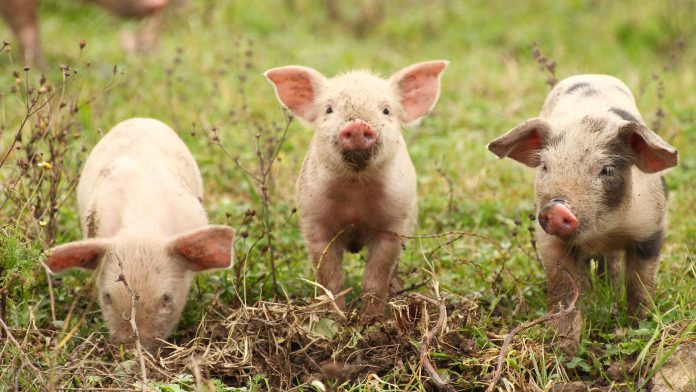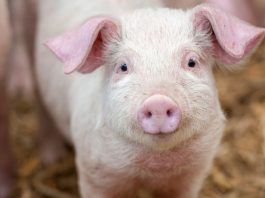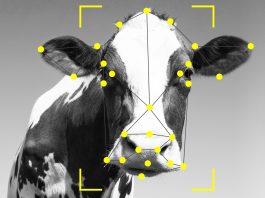The Animal Welfare Institute is dedicated to reducing animal suffering caused by people and seeks better treatment of animals everywhere.
Nine billion land animals are raised and slaughtered for food in the US each year.1 However, there are a limited number of laws in place to protect these farm animals resulting in producers being allowed to keep them in inhumane conditions with a poor quality of life.
Consumers of meat products in America, and around the globe, are becoming increasingly more aware of the treatment of farm animals. For example in 2019, a study conducted in the US found “50% of consumers who often eat beef said it’s important they eat beef that came from animals treated humanely, while 44% of frequent pork consumers said it’s important they eat pork that came from animals treated humanely”.2 In addition to this, researchers have also found that “80% of US consumers said they were concerned after learning about the treatment of factory-farmed pigs. 89% of respondents said supermarkets have a responsibility to source pork from higher welfare farms”.3
Enter the Animal Welfare Institute (AWI). Amongst a variety of initiatives, AWI aims to abolish factory farms, support high welfare family farms, and achieve humane slaughter for animals raised for food. The Innovation Platform speaks to AWI’s farm animal policy associate Allie Granger about the welfare of farm animals in the US and the importance of high welfare farming.
To start us off, can you give us an introduction into the work and role of the AWI?
AWI is a non-profit organisation located in Washington DC that works to alleviate the suffering of animals through research, advocacy and policy work. AWI focuses on a wide range of issues that impact farm animals, companion animals, animals in laboratories, marine life, and wildlife. Within the farm animal department, our goal is to end cruel methods of housing, handling, transporting, and slaughtering farm animals, and support alternative higher welfare farming practices.
AWI strives to reduce animal suffering on farms and during transport and slaughter by engaging in key legislative and regulatory efforts to shape public policy. We advocate for legislation that will offer animals fundamental protections, regularly submit public comments and petitions for rulemaking to strengthen current laws and take action against the government when the laws are inadequately enforced.
Our team also works to educate the public on issues related to industrial animal agriculture by publishing comprehensive reports and fact sheets, and encourages consumers to support higher welfare farming practices that prioritise the wellbeing of farm animals.
What would you say is the current state of the welfare of farm animals in the US, and how can this be improved?
The vast majority of animal agriculture operations today are highly industrialised and dominated by practices that enhance productivity and efficiency to maximise profits, rather than addressing the needs and well-being of the animals. Most farm animals are confined on concentrated animal feeding operations (CAFOs), often referred to as ‘factory farms’, where their space is severely restricted, and they do not have the ability to perform natural behaviors. To prevent animals from injuring themselves and each other due to stress, crowding and frustration, producers will perform painful mutilations, such as cutting off the horns of cattle, cutting off the beaks of chickens, and docking the tails of sheep, pigs, and dairy cattle.
One way to significantly improve farm animal welfare is through better food choices and consumer demand for more humane products. While much of the animal agriculture industry operates using conventional practices, there is a small but growing number of farmers that are transitioning to alternative, higher welfare farming systems that provide animals with a much higher quality of life. Increasing demand for products from higher welfare farms will put pressure on the industry and individual producers to transition to more humane production systems.
Can you tell us about high welfare farming and the advantages of this? What percentage of the US uses this farming alternative compared to other systems?
High welfare farming prioritises the needs of the animals, rather than productivity and efficiency. Animals have access to fresh air, appropriate feed, clean water and pasture, and they are raised in a stress-free environment where they have the ability to perform natural behaviours such as foraging, rooting, perching, and dust bathing.
High welfare farming also addresses the social needs of farm animals, as opposed to conventional operations where early weaning and isolation are common. Additionally, the same physical alterations and mutilations routinely performed on conventional operations are not permitted on high welfare farms. High welfare farming undoubtedly provides animals with the best quality of life, but the unfortunate reality is less than 1% of animals are raised on these farms.
In terms of the farming of pigs (in particular sows), can you explain how they are currently treated on farms? How prevalent is this in the US, and are there any distinct advantages of this system in comparison to high welfare farms?
In the US, most pigs are reared in barren indoor facilities where practices such as tail-docking, castration, and teeth clipping are performed to control damaging behaviours and facilitate intensive confinement. It is common practice on conventional operations to confine pregnant sows in crates for their four-month-long gestation where their movement is severely restricted, and they are deprived of mental and physical stimulation. Shortly before giving birth, the sows are transferred to and confined in farrowing crates. These crates are particularly stressful for sows, as their interaction with their piglets is extremely limited and they cannot build nests, which is an important instinctual behaviour. After the piglets are weaned, sows are constantly put through this cycle until they are slaughtered.
While a number of states have recently passed anti-confinement laws that prohibit gestation crates, they are still legal in the majority of states and at the federal level, and commonly used within the industry. The only advantages of this system are increased efficiency and higher output, which benefits the producers at the expense of the animals. Without the stress and frustration animals experience as a result of intensive confinement, common practices that are viewed as the most egregious (for instance physical mutilations and gestation crates) would not be necessary.
In five years’ time, where do you hope to see the welfare of farm animals (in terms of changes in legislation, policies and practices)? What role would you hope to see the AWI play in this?
In five years, we hope to see more of the industry transition to higher welfare systems and significantly improve their standards to prioritise the physical, psychological, and social needs of the animals. We hope to see more of the larger companies commit to standards that increase access to pasture and the outdoors, require more enrichments that allow animals to exhibit natural behaviours, and phase out painful physical alterations. Where the industry fails to act, we hope to see policymakers and government officials strengthen legal protections for animals on the farm and during transport and slaughter.
The momentum for change is certainly there; we are seeing consumers pay more attention to how animals are raised, companies such as food retailers and restaurants are committing to higher standards for animal care, and anti-confinement laws are making their way through numerous state legislatures. AWI will remain committed to engaging policymakers, scientists, industry, and the public to improve the lives of farm animals.
References
- https://awionline.org/sites/default/files/uploads/documents/19LegalProtectionsFarm.pdf
- Johnston, T. 2019. Alternative Proteins, Animal Welfare Concerns Shift Beef, Pork Preferences, Meatingplace, Feb 12, 2019
- World Animal Protection. 2018. New Research Shows Major Global Supermarket Chains at Risk of Losing Customers over Poor Pig Welfare (news release), Cision PR Newswire, Apr 17, 2018
Allie Granger
Farm animal program policy associate
Animal Welfare Institute
Tweet @AWIOnline
https://awionline.org/
Please note, this article will also appear in the first edition of our new quarterly publication.





